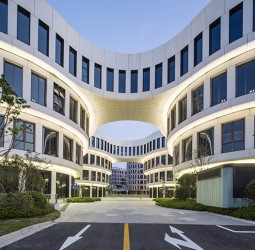建筑設(shè)計:Aisaka Architects’Atelier
主設(shè)計師:Kensuke Aisaka
攝影:Shigeo Ogawa
地址:Funabashi, Chiba
用途:Nursery school
占地面積:2,051.59m2
建筑面積:1,067.41m2
環(huán)繞土地、水、綠地的環(huán)形建筑空間結(jié)構(gòu)
Circular ring shaped structure around the soil, water and green
這個高兩層,擁有層疊屋頂花園的環(huán)形結(jié)構(gòu)幼兒園位于日本船橋市。設(shè)計將為160個兒童提供既能充分與自然交流,同時也讓家長與員工無需時刻牽掛的安全的活動空間。
A nursery school of two-story building with rooftop terrace features 3-dimensional and circuit style structure located in Funabashi city. The concept of its design is to provide enough space for 160 children to play around in the nature and also for all their parents and nursery staff to feel safe.
入口步道空間位于建筑南側(cè),而其余空間都被幼兒園功能充分利用。員工辦公室及廚房等后勤空間被設(shè)置在入口空間與幼兒園教學(xué)空間之間,這樣能夠同時保障空間使用功能的純粹與幼兒活動空間的安全性。建筑中設(shè)庭院,外邊則環(huán)繞著高大的喬木,開敞的室外平臺、坡道、臺階等活動空間分散在屋頂各處,一座長長的棧橋?qū)⒃谥虚g連接其建筑兩側(cè),環(huán)形流線空間不僅能夠給兒童提供豐富有趣的活動空間,同時在緊急情況下也能迅速地疏散人流。
The south quarter of the site is used for entrance walkway, and the rest of the part is for nursery space. Placing rooms for office staff, nursery staff and cook educations on the border between entrance and nursery space achieves both simplicity and security. We designed the circular ring shaped structure that provides enjoyable playground for children and easy access to escape route in case of emergency, having the courtyard in the middle, planting trees along the outer edge, and installing the deck, slopes, stairs, and the bridge along the circle between them.
四邊形墻壁和屋頂堅實穩(wěn)固,給身處其中的兒童提供了無盡的安全感,讓他們放心的玩耍。而環(huán)繞內(nèi)院的走廊被出挑的屋頂所覆蓋,為孩子遮風避雨,免去家長的無謂擔憂。同時,這種半室外的交通空間也為繁忙的家長節(jié)省了穿、脫鞋的時間,保證他們能夠在幼兒園員工的幫助下迅速地接送孩子。
Covered with the solid trapezoid-shape wall and roof outside, its overall structure achieves to protect children’s pleasure with its strength. Its O-shaped building surrounding the courtyard with outside corridor with eaves for weather protection also provides comfort and a sense of safety to adults. This structure helps busy parents to drop and pick up their children quickly without taking off shoes and nursery staff to help each other on the other side.
每層的室外空間不僅開敞通透,同時也充滿了趣味。陽光燦爛的大空間或陰涼的角落,高屋檐與狹長的走道空間,自然緩坡與小山包,以及由于空間方向和高度改變而產(chǎn)生的各種虛空間,豐富的變化都讓兒童在一年中都不會感到乏味。種滿植被的內(nèi)院不僅促進了空氣的流通,同時也培養(yǎng)了兒童對于自然的熱愛。
Outer space of each floor provides not just open space outside, but also various changes, such as sunny spot and shade, higher eaves and narrower space under eaves, slopes, hills and cavities produced by changing the direction and the height of floors and roofs, so that children to spend the whole year here do not get bored. The half-circle-shaped spot garden to help ventilation also nurtures children’s affection to the nature by planting greens in the center.
建筑的設(shè)計還充分考慮了飲食教育的內(nèi)容。無論是屋頂露臺的蔬菜園,還是一層以玻璃幕墻與走廊分隔的廚房都能夠激發(fā)兒童對于食物的喜愛與興趣。同時,較低的廚房室內(nèi)地平不僅能夠讓孩子們更方便地觀察廚房的工作過程,也讓里面的工作人員也能在準備食物的同時監(jiān)管內(nèi)院孩子們的活動情況。
From the perspective of dietary education to develop children’s appreciation and interest toward food, we place the vegetable garden on the rooftop and glass-walled kitchen on the first floor. The floor level of kitchen is settled lower to let children look into kitchen, in the same time, it is able to keep an eye on the courtyard in a cross shape to compensate for blind spot from the office.
環(huán)境規(guī)劃
Environmental Plan
為了實現(xiàn)建筑節(jié)能,建筑師應(yīng)用了屋檐來控制陽光照射,天井花園提升了建筑的通風能力,屋頂?shù)募装迮c蔬菜花園加強了屋頂?shù)母魺岜兀玫責崮芄┡牡乇砉艿啦膳到y(tǒng),二次利用雨水的內(nèi)院水塘與小溪以及能夠循環(huán)電能的太陽能板。而兒童在耳濡目染之間,也能學(xué)到關(guān)于植被、風、雨的形成等等自然現(xiàn)象的各種知識。
For thorough energy saving, we adopt the eaves to control sunlight, the spot garden to improve ventilation, the rooftop deck and vegetable garden for heat insulating of rooftop, Earth Tube heating system to use geothermal heat, the river and the pond to reuse the rainwater, and solar panels to produce circulating power. Watching these structures in daily life, children can learn about “the nature” including phenomenon about plants or the wind and rain.
細節(jié)設(shè)計
Detailed Design
墻與圍欄等細節(jié)處的圓形倒角一方面是出于安全的考慮,另一方面出于對光的利用,讓天光或室內(nèi)光柔和照射到建筑各角落。圓角矩形的內(nèi)院花園也將通過中心的綠色植物吸引孩子們的注意力,激發(fā)他們對自然的熱愛。
Round chamfering was done for walls and railings necessary for safety reasons and also for the edge of light and skylight in every part of the building using it as a motif of design. The half-circle-shaped spot garden brings children the affection to the nature by catching their attention to the green planted in the center.
內(nèi)部與外部空間的裝飾
Finishing work of Interior and Exterior
為了讓孩子們有機會學(xué)習(xí)到各種建材的名字以及其自然屬性,無論木頭、鋼鐵或是石材,設(shè)計中的用材都盡量保持了其原真性。為了起到寓教于樂的效果,設(shè)計并不一味采用三原色來作為主體顏色,而對各種空間采用三圍的基礎(chǔ)顏色結(jié)構(gòu)來提供更加多元、沖突的空間感受。
In order to give children the opportunity to learn the name of materials with feeling its original texture in the same time, we try to use “wood as wood-like, steel as steel-like and stone as stone-like” to keep the original texture of each material. From this perspective, we didn’t use the primary colors. Instead, we exploit the 3-dimensional and so-called “primary color-like” structure to provide contrasting experience using the various spatial features and environment.
設(shè)計理念:”Amane”
Amane在日語中意為“圓”或“環(huán)繞”,設(shè)計師希望設(shè)計能夠讓兒童充分感受到環(huán)抱大自然的恩賜,同時也代表著環(huán)抱綠色的建筑空間設(shè)計。兒童將自如地在建筑與自然中活動,任意感受身邊事物,培養(yǎng)他們的感知與思考的能力。
“Amane” is one of the Japanese kanji that stands for “round,” “around” or “all-around”, which represents the wish of the nursery school to let children feel the blessing of the all-around nature and also its architectural feature of circular shape around the woods. We wish that children can go around both inside and outside of the building, feeling everything around here, and nourish their sensibility and ability to think.


